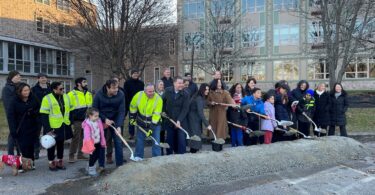Holyoke, MA – DiMella Shaffer, an architecture and design firm, has unveiled a renovation project at Holyoke Community College’s Center for Life Sciences at Marieb Hall.
Named after Dr. Elaine N. Marieb, an instructor at the College for 26 years and renowned authority in anatomy and physiology, Marieb Hall is a brutalist-style building, originally built in the 1960s.
With a goal of modernizing the life science and biotechnology labs and classrooms, DiMella Shaffer focused on renovations to 13,000sf of the building. To plan for this project, a study was conducted to measure the current layout of the facilities against the needs of the faculty and students utilizing the space.
As a result, the project produced a new biotechnology teaching lab, microbiology teaching lab, new classroom and lecture space, an upgrade to first-floor common areas, new student space, a prep lab, new meeting spaces for students, and updated offices for instructors.
In addition, DiMella Shaffer designed a state-of-the-art cleanroom, a first for a Massachusetts two-year institution. This cleanroom arms students with the knowledge, skills, and proper protocols for working in the biotechnology and life science industries.
The cleanroom has an ISO 8 certification, representing air containing at or less than 100,000 particles per cubic foot. Constructing the cleanroom also involved the modernization of the lab’s acid waste neutralization system to align with industry standards.
The project was funded through a $3.8 million Massachusetts Life Sciences Center grant and $750,000 from the HCC Foundation’s Building Healthy Communities Campaign.
The recent renovation is the first phase of several Holyoke Community College hopes to accomplish in the future to further modernize the building, improve sustainability and provide students with the resources and environment to foster growth and sharpen skill. The new center aims to provide updated facilities for biology, zoology, botany, veterinary technology and animal science, anatomy and physiology, forensic science, environmental science, and sustainability studies.












